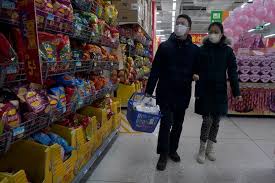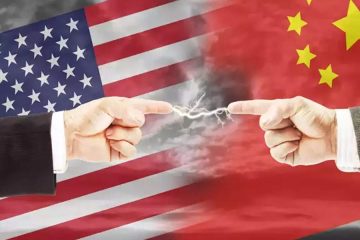Coronavirus cases rise as recessions loom in Singapore, Japan

Japan and Singapore appeared to be on the brink of recession on Monday as the coronavirus epidemic disrupted tourism and supply chains around the world, and as China imposed tougher restrictions to try and stop the virus spreading further.
The number of reported new cases of coronavirus in China’s Hubei province, the epicenter of the epidemic, rose on Monday by more than 1,933, after two days of falls, and there were 100 deaths reported since Sunday.
Across mainland China, officials said the total number of cases rose by 2,048 to 70,548, with 1,770 deaths.
Nearly 90% of new cases were in Wuhan, a city of 11 million people where the virus is believed to have originated at a market illegally trading wildlife late last year.
The virus, which is believed to have a 14-day incubation period, has forced thousands of people to be quarantined around the world.
In Cambodia, authorities were scrambling to track down hundreds of passengers who disembarked from the Holland America Line cruise ship Westerdam after an American woman left the ship and was tested positive for coronavirus in Malaysia.
More than 100 have already left the country, while some 300 are reportedly still in Cambodia.
“I believe there’s 300 Americans here at this hotel plus a few hundred from other countries. We will all be tested for the coronavirus today and tomorrow by the Cambodian Ministry of Health,” said passenger Holley Rauen, a public health nurse and midwife from Fort Myers, Florida.
“We have no idea when we get to get home…”
American passengers were taken off another cruise liner on Sunday to fly home after being quarantined for two weeks off Japan.
Seventy new coronavirus cases were confirmed on board the Carnival Corp. Diamond Princess in Yokohama.
The 3,700 passengers and crew have been held since Feb. 3. Some 355 people on board have tested positive for the disease, by far the largest cluster of cases outside China.
Those with the disease have been taken to hospital in Japan and no one from the ship has died. Around half of the guests onboard are from Japan.
Australia will evacuate more than 200 of its citizens from the ship, Prime Minister Scott Morrison said on Monday.
Concerns about the spreading disease raised the possibility that organizers may cut the number of participants at next month’s Tokyo Marathon.
Outside China, more than 500 infections have been confirmed, mostly in people who traveled from Chinese cities, with five deaths – in Japan, the Philippines, Hong Kong, Taiwan and France.
RECESSION FEARS
After an extended Lunar New Year holiday, China urgently needs to get back to work. But some cities remain in lockdown, streets are deserted, employees are nervous, and travel bans and quarantine orders are in place around the country.
Many factories are yet to re-open, disrupting supply chains in China and beyond for everyone from smartphone makers to car manufacturers.
China’s central bank cut the interest rate on its medium-term lending on Monday, a move expected to pave the way for a reduction in the benchmark loan prime rate on Thursday, to lower borrowing costs for companies hit by the virus.
Beijing has also announced plans to roll out targeted and phased tax and fee cuts to help for businesses.
Even so, many economists expect China’s economic growth to slow and ratings agency Moody’s on Monday revised downward its 2020 GDP growth forecasts for China to 5.2%. That compares with the 5.7% growth China would need this year to meet its long-term goal of doubling GDP over the decade to 2020, according to a government economist.
In Japan, virus-related damage to economy is expected to show up in the current quarter, stoking fears of recession in the world’s third-largest economy which is already shrinking at the fastest pace since the second quarter of 2014.
Trade-dependent Singapore downgraded its 2020 economic growth forecast and is set to unveil measures to cushion the blow from the epidemic on Tuesday. Singapore Prime Minister Lee Hsien Loong said on Friday that a recession was a possibility.
MORE RESTRICTIONS
Hubei province and its capital, Wuhan, have been virtually sealed off and locked down since Jan. 23, with schools, offices and factories shut and most travel suspended.
Nevertheless, restrictions were tightened in Hubei on Sunday with a ban on vehicles, apart from essential services, and companies told to stay shut until further notice.
Fast food chains like McDonald’s Corp and Starbucks Corp are ramping up “contactless” pickup and delivery services in China to keep workers and customers safe, the companies said.
Customers order remotely – on mobile phones or by computers in store – and employees seal the meals in bags and put them in a special spot for pickup without human contact, McDonald’s says on its website.
For the past two weeks China’s police have raided houses, restaurants and makeshift markets to enforce a temporary ban on catching, selling or eating wild animals, arresting nearly 700 people.
The scale of the crackdown, which has netted almost 40,000 animals including squirrels, weasels and boars, suggests that China’s taste for eating wildlife and using animal parts for medicinal purposes is not likely to disappear overnight, despite potential links to the new coronavirus.
Traders legally selling donkey, dog, deer, crocodile and other meat told Reuters they plan to get back to business as soon as the markets reopen.


